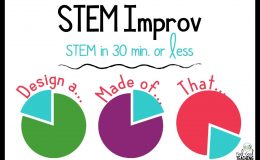I know the feeling. You planned a fun STEM Challenge and it’s going to be a great day! You envisioned students hard at work, excelling in their designs, topped off with joyful chatter … maybe even a “Best day ever!” thrown in here or there. You know just where you’ll place that teacher of the year trophy on your desk!
But then reality set in. A couple of the groups just failed to launch. They struggled, argued, and were frustrated. When you wouldn’t help them (because helping them doesn’t help them), they got salty with you. And even though you’re the adult, you were tired and frustrated too and you got salty back.
This wasn’t how you pictured it. Now you’re wondering why you even bothered with STEM Challenges in the first place. Your teacher BFF told you STEM Challenges were ah-mazing. Liar!
This was too hard for your students. They didn’t have fun. Everyone’s just mad now. You clean up the materials and decide never to speak of this challenge again.
And if your resolve on that holds, you’ll miss out on some of the most powerful lessons you have the incredible opportunity to teach.
Here’s the thing you must know, first and foremost: The struggle isn’t the problem, it’s the point.
Had the challenge been easy for all your groups to complete, we’d call it a STEM Challenge Easy. The very fact that your students encountered struggle is your first sign you’re doing something right! You’ve set up the criteria & constraints of the challenge in such a way that the students were pushed beyond their comfort zone into real critical thinking and problem-solving. Kudos! Good on ya!
Cold comfort? I get it. Here’s the thing … you’ve got to get your game face on when you walk into a challenge so that you can help students not to crumble at the first sign of trouble and learn to approach struggle in a productive way. That doesn’t happen by accident.
Most kids need instruction and modeling in approaching tough problems with grit, determination, and growth mindset.
So just say no, teachers!
- No, you don’t need to show students examples, pictures, and models before they build.
- No, you don’t need to help them solve their design problems.
- No, the fact that students struggled does not mean the challenge was too hard for them.
- No, you do not have to “save” them from failing.
- No, you don’t have to mirror students’ panic or frustration when they fail.
What Can Teachers Do to Prepare?
The first thing teachers can to is prepare mentally before a challenge. Remind yourself helping students work through tough problems is one of your objectives. Knowing that makes it easier for you to get excited when struggle naturally arises. No, I’m not crazy, I just know how many HUGE lessons came from an activity that initially failed — lessons that can’t happen any other way than as a result of an epic “fail”!
Preparing yourself in this way makes it easy to get pumped up when the struggle sets in. You were expecting this! You are ready for it! You’re a model for growth mindset, not a mirror for frustration and defeat!
Remember, there is no growth without struggle! When you go to the gym, the trainer doesn’t say, “Let me lift those weights for you.” That wouldn’t help you get strong. You’ve got to work your own muscles. You’ve got to feel that temporary discomfort to get the results you want.
Productive struggle is how muscles get strong. It’s also how powerful learning happens – the learning that feels authentic, relevant, and gives students a sense of pride knowing they can do hard things on their own.
And, yes, it’s true that when you really challenge students, you might give them something they initially struggle with or can’t yet do. That’s fine! It can be great, even. The most important thing is not to just throw out the challenge when this happens. Use it.
What is more powerful than struggling, failing, analyzing, making a new plan, and getting back up to try again? Isn’t that what we want for our kids? Why then, are we protecting them from stretching outside their comfort zones?
Failure is only final when we give up. We don’t want to implicitly teach students that when things seem too hard, just give up and pretend it never happened.
How do we expect students to become gritty or self-reliant if we keep saving them from even the slightest discomfort?
Students should be given the opportunity to fail early and often, and they should be taught how to recover from that failure too. If they leave your class knowing how to fail, adjust, and bounce back, you will have given them the most important tools for a successful life.
So teachers, please don’t shrink from giving your students true challenges. Don’t panic when they fail. Get excited! You now have the opportunity to teach them crucial life skills.
Make creating a culture of real curiosity, scientific reasoning and analysis, and prioritizing process over product one of your goals. You’ll find lots of content on this site to help you hone your STEM Challenges into powerhouse learning opportunities. One great place to start is the free webinar on Secrets to Successful STEM Challenges.
Just know this, if your students are struggling, that’s not necessarily a bad thing! It’s probably a sign you’re doing something right.
How can you help students recover from an “epic fail”? The next step is to learn what to do to get all the good you can get from their productive struggle!
By the way, you should definitely check out this book I LOVE by Angela Duckworth. I’ve read it twice and marked it all up. It has so many nuggets of wisdom!

Have a question or thought about productive struggle? Let me know in the comments!
PIN ME










